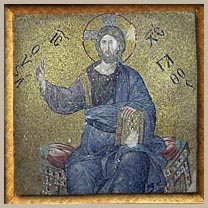Chapter Twenty Four - New Troubles
The train arrived in Tiumen quite late at night. The izvostchik stopped at every hotel in town, but I could not get a room and so I was forced to lower myself to a room in a private house. In the morning I went to the docks to find out if it was true that shipping had stopped. I had to find out if it was true. It was.
So, I had to continue my journey by horse drawn carraige. The administration immediately found me a carriage and promised to send me a driver with whom I could arrange for departure. Going back home, I found a visiter; one of the servants to the Court who, I don't know how now, had learned of my arrival and got my address. He told me that there were also other people in Tiumen who had been in service to the Court: Gilliard, Miss Tegleva, Miss Herzberg, Baroness Buxhoeveden, and they all lived together. I went to see them. They were quite surprised to see my since they believed that I was dead, shot.
They all lived very mediocrely. We sat down to eat. The dinner was very plain, poor. We talked about everything that had happened. Baroness Buxhoeveden was very interested in my journey, gave me good advice, and gave me a gift of a pair of fur boots and a winter coat, which was exactly the things I needed en route as the snows of winter had set in. I said goodbye to all my colleagues from the Court and left them only with great pain in my heart.
I got to Tobolsk in a simple postal carriage. In Tobolsk, I went straight to the convent's stable hoping that I could find a horse there so that I could go to the convent itself where my family was living. I could find neither carriage nor horse, so I left on foot accompanied by a nun. The route to the convent seemed much shorter to me this time than before, especially since I was eager to regain my family.
My family, it goes without saying, was very happy at my return. Mother Superior, who gave me a very warm and kind greeting, had looked after them in my absence with a motherly attitude, and had hidden the news of my death from them.
So a new life, secure and calm amidst my family began to unfold.
Some time later, I was called by General Commander in Chief Ivanov-Rynov to Vladivostock, also at the same time as Mrs. T.E. Melnik (born Botkin) and her brother G.E. Botkin. They paid our fare in advance.
Why they made us go to Vladivostock I never knew. Melnik and Botkin were happy to find their uncle, most especially than in Tobolsk they where sheltered from feeling any of the danger.
In Vladivostok I stayed in General Krechtchatitzki's train, waiting to be told of the reason for my trip. Many of the residents of Vladivostock invited me to their homes and asked about the recent past. I spent a month like that. Without ever learning why I had come, I decided to return home, back to my family, but I did not know what to do. Happily for me, a special train was going to leave for Omsk taking the British mission which included Mr. Gibbs. Gibbs had me accepted by the mission which brought me to Omsk on their train. From there I went to Tobolsk on the ship Tovarpar, where I arrived on June 9.
I stayed in Tobolsk until August 27. That day, the aide-de-camp to Gen. Diedericks, Boris V. Molostvov arrived at my house with an order from the General that I was to go with my family to Omsk.
We left Tobolsk on the ship Olga, along with bands of insurgents who were always firing gunshots, but they did nothing bad to us.
They wanted to requisition an apartment for me in Omsk, but I went to stay with friends who I had written from Tobolsk.
The day after I arrived in Omsk I was received by the Prosecution Judge Sokolov, and was invited to stop by his house to give my deposition. I went there at the appointed time. He received me kindly. I began my deposition that same day and it continued until September 21, they day I left Omsk. During that month I went to visit General Diedericks and Admiral Kolchak who asked me many questions about the Imperial Family.
We already felt the Bolsheviks were approaching; they evacuated everything of any value out of Omsk, as well as all of the surplus military provisions. General Krechtchatizki offered to take me with him to Harbin in his train car. General Diedericks gave me permission to accept his offer. We travelled without incident, a guard travelled with us, and an armored train went in front of us. We were all armed. A machine gun was in the same train car with us.
In Harbin they gave me use of a room in Krechtchatziki's house. There I spent the whole winter of 1919-1920. In the spring General Horvat (Governor Genral of Harbin) appointed me to the post of Director of Forestry products at the Imen-po station. However just when I wanted to leave for Imen-po with my family, a strike erupted on the railroad, which caused me to be late by a week. During that week I was still in Harbin, the staff and workers at Imen-po, having learned of my appointment, began to meet and deliberate as the agitation did not end with the strike. They declared that I was a Colonel of the ataman Semenov's detachment and so that upon my arrival they would direct my traincar onto a parking siding and destroy it in order to kill me. They put their plan into execution. They unhooked my train car and put it on the parking siding. During the manouever, the locomotive backed up as if by accident and struck my car so violently that it was obvious they wanted to destroy it and my family and I along with it. The whole family cried, my little girl was nearly killed. I shouted through the open door to the station master asking him to take all necessary security measures for my family. I felt that a crime was going to be committed. The station master then ordered to put my train car into the storage depot for the rolling stock, so that my family and I could live in the car until finding suitable lodgings. One of the station guards later told me that they had wanted to kill me and my entire family. My work required frequent trips into the forest with a train of fourteen double cars. There was alwyas the danger of attack from the Hunhuz. Fortunately the workers, who were mostly Chinese, were very brave men.
Nevertheless, I was almost taken prisoner by a band of Hunhuz while loading my train with wood one day. Thirty to forty armed men suddenly appeared out of nowhere, and thinking that I was an official employee of the railroad, they wanted to kidnap and take me into the mountains. I was saved by the chinese guard, who went up to the leader and spoke to him.
They came back to me. The Hunhuz leader shook my hand, and asked me in very good Russian "You are not a captain?"
I answered, "Not at all. I am simply in the forest with the work train getting railway sleepers."
"Let them go free," the leader ordered.
The Hunhuz went up to the train and, after shaking hands with all of the workers, Russian and Chinese, they looked at the train cars and the work we had done. One Hunhuz recognized one of our workers as an old enemy of his, who had badly mistreated him before. The Hunhuz ordered his men to strip him of his clothes and beat him until he lost consciousness. I saw his body, all black from the savage beating, laid out in a train car. He opened his eyes and asked for water. A month later he was back on his feet like nothing had happened.
In 1922 I left the Far East, returning to Europe, and moved to Estonia.
The End.
Comments on this site should be directed to Bob Atchison.

